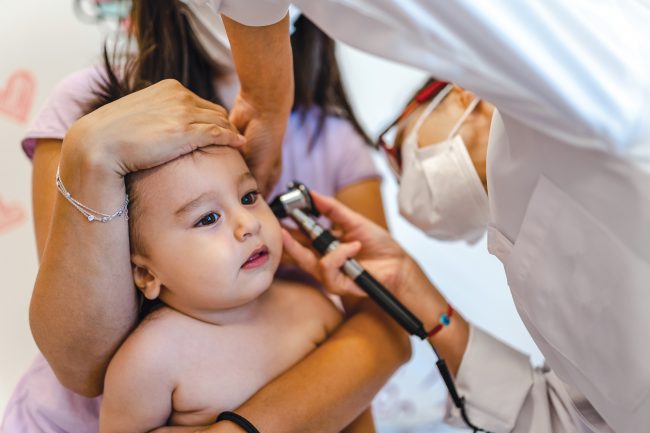In your baby’s first year, you’ll have a lot of questions—and a lot of doctor’s appointments. These visits, called well-baby checkups, are the best way to track your baby’s growth, catch any concerns early and get expert advice for every stage.

What Happens at a Well-Baby Visit
If your baby has any health conditions or sees specialists, the checkup is a great opportunity to update their primary care provider and make sure everyone is on the same page.
At each visit, your baby’s doctor or nurse will:
- Measure your baby’s height, weight and head size.
- Check how your baby is growing, moving and interacting.
- Ask how you and your baby are doing at home.
- Answer your questions about sleep, feeding, development or anything on your mind.
- Give vaccines or screenings if needed.
- Check your baby’s hearing, vision and even their first little teeth!
Baby’s First-Year Checkup Schedule
Schedules can vary, but here are recommended well-baby checks and procedures.
- Birth to 5 days old: Vision, hearing and blood tests; First vaccine
- By 1 month: May get a vaccine
- 2 months: Vaccines
- 4 months: Vaccines
- 6 months: Vaccines
- 9 months: May get vaccines
- 12 months: Blood test for anemia
- 15 months: May get vaccines
- 18 months: May get vaccines
- 24 months: May get vaccines
Tips for a Better Checkup
- Write down questions ahead of time—no question is too small.
- Bring a list of any medications your baby is currently taking.
- Keep your baby’s vaccine card and bring it to every visit.
- Try to see the same doctor each time, so they get to know your baby (and you).
- If your baby has been to the hospital or seen a specialist, make sure to tell the pediatrician.
- If you need more time to talk, let the doctor’s office know in advance.
Baby Health Basics: What to Watch For
Babies can’t tell you when something’s wrong—but they can show you.
- Here are some signs your baby might be sick:
- Loss of appetite, vomiting or diarrhea
- Pale skin or dark circles under the eyes
- Fussiness or trouble sleeping
- Fever over 100.4°F (especially if under 3 months)
- Crying or pain that doesn’t stop
Call 911 if your baby:
- Is breathing fast or grunting
- Has blue lips or seems limp
- Has a seizure or can’t wake up
Hearing & Vision: Catching Problems Early
You know your baby best. If something seems off, trust your gut. Look out for:
- No reaction to loud sounds (after 2–3 months)
- Not turning to your voice by 6 months
- Eyes that cross or don’t follow movement after 4 months
Ask your provider for a screening at any checkup. Insurance (including Medicaid and KidsCare) usually covers hearing and vision screenings. Or, check out Eyes on Learning or InfantSEE for free or low-cost screenings.

What About Ear Infections
If your baby is tugging on their ear, crying more than usual or has a fever, they might have an ear infection. Call your doctor to have it checked out, especially if it doesn’t improve within a day or two.


